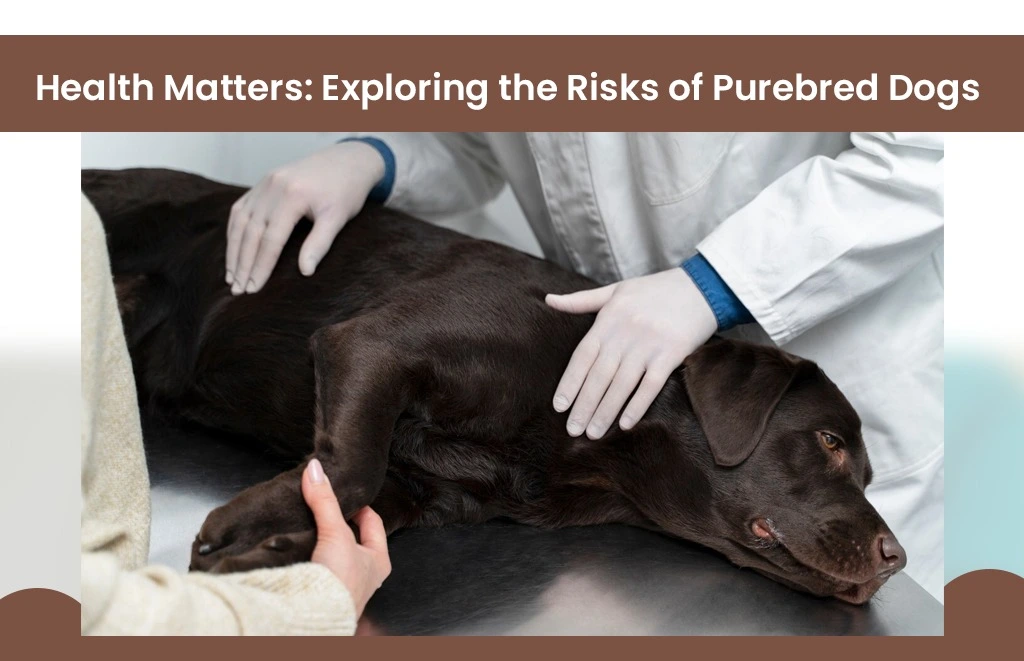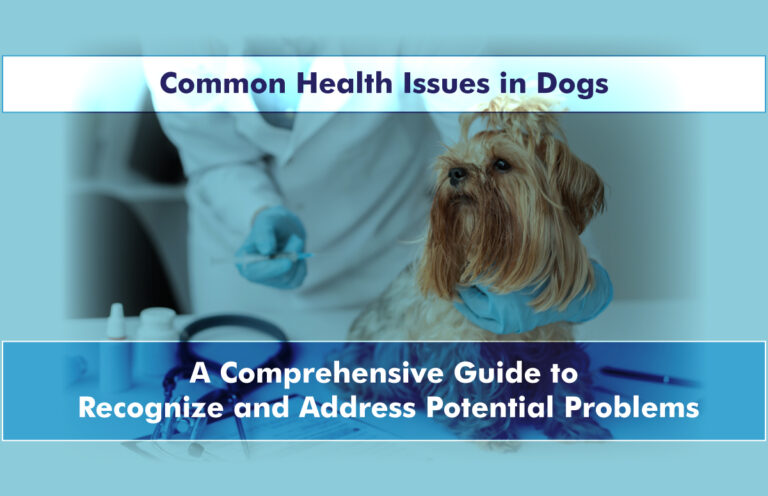Health Matters: Exploring the Risks of Purebred Dogs
Table of Contents
- Introduction
- Understanding Purebred Dogs
- The Appeal of Purebreds
- Common Health Risks
- Inherited Conditions
- Breeding Practices and Health
- Responsible Breeding Practices
- Ethical Considerations
- The Impact on Pet Owners
- Making an Informed Decision
- Adopting vs. Buying: A Health Perspective
- FAQ
- Conclusion
Introduction
If you are a dog lover, you may prefer a particular dog breed. You may admire their appearance, personality, or history. You may also believe purebred dogs are healthier, more intelligent, or more predictable than mixed-breed dogs. However, you may not be aware of the health risks of purebred dogs and what they face due to selective breeding and inbreeding. In today’s blog post, we will explore the health risks of purebred dogs that affect them and why they are more prone to them than mixed-breed dogs. We will also discuss the ethical and practical implications of breeding and buying purebred dogs and how you can make an informed decision for yourself and your furry friend.
Understanding Purebred Dogs
Purebred dogs belong to a specific breed and have a documented pedigree that traces their ancestry within that breed. According to the Kennel Club of India (KCI), there are about 300 recognised dog breeds in the world, each with its breed standard that defines its ideal physical and behavioural characteristics. The KCI registers purebred dogs, issues registration certificates to their owners, and organises dog shows and events where purebred dogs are judged and awarded based on their conformity to the breed standard.
Purebred dogs result from selective breeding, which is the practice of mating dogs with specific traits to produce offspring with those traits. For thousands of years, selective breeding has been done for various purposes, such as hunting, herding, guarding, or companionship. However, selective breeding can also lead to inbreeding, which is the practice of mating closely related dogs, such as siblings, parents, or cousins. Inbreeding is done to maintain the purity and consistency of a breed. Still, it can also increase the risk of genetic diseases and defects.

The Appeal of Purebreds
Many people prefer purebred dogs over mixed-breed dogs for various reasons, such as:
Appearance:
Purebred dogs have a distinctive and consistent appearance that matches the breed standard and the owner’s expectations. Some people may like the look of a particular breed, such as the fluffy coat of a Pomeranian, the wrinkled face of a Pug, or the long ears of a Basset Hound.
Personality:
Purebred dogs have a predictable and stable personality that reflects the breed’s temperament and behaviour. Some people may like the personality of a specific breed, such as the loyalty of a German Shepherd, the friendliness of a Labrador Retriever, or the intelligence of a Poodle.
History:
Purebred dogs have a rich and fascinating history that traces their origin and purpose. Some people may like the history of a particular breed, such as the royal heritage of a Chihuahua, the hunting prowess of a Beagle, or the spiritual significance of a Lhasa Apso.
Status:
Purebred dogs have a high and prestigious status that signifies their quality and value. Some people may like the class of a particular breed, such as the rarity of a Tibetan Mastiff, the popularity of a Golden Retriever, or the price of a Rottweiler.
Common Health Risks
While purebred dogs may have many appealing qualities, the health risks of purebred dogs make them get to affect their quality and longevity. A Nationwide study found that health risks of purebred dogs include high risk of cancer compared to mixed-breed dogs. According to Forbes Advisor’s analysis of vet visit costs, the average cost of cancer treatment for a dog is ₹3,00,000. Other common health issues that affect purebred dogs are:
Hip Dysplasia:
This medical disorder results in arthritis, stiffness, and pain in the hip joint due to malformation. It is common in large, giant breeds, such as the German Shepherd, Saint Bernard, and Great Dane.
1.Patellar Luxation:
This is a condition where the kneecap slips out of place, causing lameness, swelling, and inflammation. It is common in small and toy breeds, such as the Pomeranian, the Chihuahua, and the Maltese.
2.Brachycephalic Syndrome:
This is a condition where the skull is shortened and flattened, causing breathing difficulties, snoring, and overheating. It is common in short-nosed breeds, such as the Pug, the Bulldog, and the Shih Tzu.
3.Eye Problems:
These conditions, such as cataracts, glaucoma, and cherry eye, affect the eyes. They can cause blindness, irritation, and infection. They are common in breeds with prominent or bulging eyes, such as the Cocker Spaniel, the Basset Hound, and the Pekingese.

4.Skin Problems:
These conditions, such as allergies, infections, and tumours, affect the skin. They can cause itching, hair loss, and odour. They are common in breeds with long or curly coats, such as the Lhasa Apso, the Poodle, and the Dachshund.
Inherited Conditions
One of the leading causes of health risks of purebred dogs is inherited conditions, which are genetic diseases or defects passed down from parent to offspring. Inherited disorders are more common and severe in purebred dogs than in mixed-breed dogs because purebred dogs have a smaller gene pool and a higher chance of inheriting the same faulty genes from both parents. Some of the inherited conditions that affect purebred dogs are:
1.Heart diseases:
These are conditions that affect the heart, such as cardiomyopathy, valve dysplasia, and subaortic stenosis. They can cause heart failure, arrhythmia, and sudden death. They are common in breeds such as the Boxer, the Doberman Pinscher, and the Cavalier King Charles Spaniel.
2.Neurological disorders:
These include disorders of the neurological system, such as cerebellar ataxia, degenerative myelopathy, and epilepsy. They can cause seizures, paralysis, and loss of coordination. They are common in breeds such as the German Shepherd, the Beagle, and the Golden Retriever.
3.Skeletal disorders:
These conditions, such as osteochondrosis, panosteitis, and muscular dystrophy, affect the bones, joints, and muscles. They can cause pain, inflammation, and weakness. They are common in breeds such as the Rottweiler, the Great Dane, and the Labrador Retriever.
4.Endocrine disorders:
These are conditions that affect the hormones, such as hypothyroidism, diabetes, and Cushing’s disease. They can result in weight gain, hair loss, and increased thirst and urination. They are common in breeds such as the Dachshund, the Poodle, and the Samoyed.
5.Immune disorders:
These conditions, such as autoimmune haemolytic anaemia, lupus, and pemphigus, affect the immune system. They can cause anaemia, skin lesions, and infections. They are common in breeds such as the Cocker Spaniel, the Shetland Sheepdog, and the Akita.
Breeding Practices and Health
Another factor that influences the health of purebred dogs is the breeding practices and standards followed by the breeders and the kennel clubs. Some of these practices and standards may harm the health and welfare of the dogs, such as:
1.Breeding For Appearance:
Some breeders and kennel clubs may prioritise the appearance of the dogs over their health and functionality. They may breed dogs with exaggerated or unnatural features, such as extremely large or small sizes, flat or extended faces, or curled or docked tails. These features may impair the dogs’ ability to breathe, move, or reproduce and may cause various health problems, such as spinal deformities, eye ulcers, or breathing difficulties.
2.Breeding For Popularity:
Some breeders and kennel clubs may breed dogs in high demand or fashion and produce many puppies to meet the market needs. This may result in overbreeding, which may reduce the genetic diversity and quality of the dogs and may increase the risk of inherited diseases and defects. It may also result in poor breeding conditions, such as overcrowding, malnutrition, or lack of hygiene, affecting the dogs’ and their offspring’s health and welfare.
3.Breeding For Profit:
Some breeders and kennel clubs may breed dogs for profit and may sell them at high prices or low standards without regard for their health and well-being. They may also falsify or withhold information about the dogs’ pedigree, health, or temperament and deceive or mislead the buyers. They may also neglect or abandon the dogs that are unsold, unwanted, or unhealthy, and may contribute to the problem of stray dogs and animal shelters.

Responsible Breeding Practices
While some breeding practices and standards may be harmful to the health and welfare of purebred dogs, there are also some responsible breeding practices and standards that can be followed by the breeders and the kennel clubs to improve the health and welfare of the dogs, such as:
1.Breeding For Health:
Some breeders and kennel clubs may breed healthy and functional dogs. They may avoid breeding dogs with health problems or defects or that are carriers of genetic diseases. They may also test the dogs for health issues and provide the buyers with health certificates and guarantees. They may also breed dogs with a balanced and natural appearance and conform to the breed’s original purpose and function.
2.Breeding For Quality:
Some breeders and kennel clubs may breed high-quality and standard dogs. They may limit the number of puppies they produce to ensure quality and care. They may also maintain the genetic diversity and integrity of the dogs and may avoid inbreeding or crossbreeding. They may also provide the dogs with proper breeding conditions, such as adequate space, nutrition, and hygiene, and may ensure their socialisation and training.
3.Breeding For Ethics:
Some breeders and kennel clubs may breed dogs for ethics and may respect the rights and interests of the dogs and their buyers. They may also provide accurate and honest information about the dogs’ pedigree, health, and temperament. They may advise and educate the buyers on how to care for and handle the dogs. They may also follow up, support the buyers and the dogs, and take back or rehome them if needed. They may also spay or neuter the dogs unsuitable for breeding and may support animal welfare and adoption initiatives.
Ethical Considerations
Besides the health risks, some ethical considerations may arise from breeding and buying purebred dogs. Some of these are:
1.Animal Rights:
Some people may argue that breeding and buying purebred dogs violates the rights and dignity of the dogs, as they are treated as commodities, objects, or status symbols rather than as living beings, individuals, or companions. They may also argue that breeding and buying purebred dogs contributes to the exploitation, suffering, and death of the dogs, as they are subjected to unnatural and harmful practices, such as overbreeding, inbreeding, mutilation, or abandonment.
2.Animal Welfare:
Some people may argue that breeding and buying purebred dogs compromises the welfare and quality of life of the dogs, as they are exposed to various health problems, diseases, and defects that affect their physical and mental well-being. They may also argue that breeding and buying purebred dogs deprives the dogs of their natural and essential needs, such as exercise, stimulation, and socialisation, that are vital for their happiness and fulfilment.
3.Animal Diversity:
Some people may argue that breeding and buying purebred dogs threatens the diversity and survival of the dogs, as they reduce the genetic variation and resilience of the dogs and increase the risk of extinction or endangerment of the breeds. They may also argue that breeding and buying purebred dogs displaces and marginalises the other types of dogs, such as mixed-breed dogs, native dogs, or street dogs, that are equally deserving and valuable.
The Impact on Pet Owners
The health and ethical issues that affect purebred dogs also have an impact on the pet owners, who may face various challenges and dilemmas, such as:
1.Financial Cost:
Owning a purebred dog can be very expensive, as the initial purchase price can range from ₹10,000 to ₹1,00,000, depending on the breed, the breeder, and the demand. The ongoing maintenance cost can also be high, as the dog may require frequent and specialised veterinary care, grooming, food, and supplies to cope with their health problems and needs.
2.Emotional Stress:
Owning a purebred dog can be very stressful, as the owner may have to deal with the dog’s health issues, such as pain, illness, or disability. It may have to make difficult decisions, such as treatment, surgery, or euthanasia. The owner may also have to cope with the dog’s behavioural issues, such as aggression, anxiety, or depression, and may have to provide constant care, attention, and training to the dog.
3.Moral Conflict:
Owning a purebred dog can be very conflicting, as the owner may have to face ethical questions and criticisms, such as whether they are supporting or opposing animal rights, welfare, and diversity and whether they are contributing to or solving the problem of stray dogs and animal shelters. The owner may also have to justify their choice and motive, such as whether they are adopting or buying the dog for the right reasons and fulfilling their responsibilities and duties to the dog.
Making an Informed Decision
If you are considering owning a purebred dog, you need to make an informed decision that takes into account the health and ethical aspects, as well as your own preferences, expectations, and capabilities. Here are some steps to follow:
1.Research and Learn:
You need to research and learn about the breed of dog you are interested in and its history, characteristics, health issues, and needs. You also need to study and learn about the breeder or the kennel club you are dealing with and find out their reputation, credentials, and practices. You can use various sources and resources, such as books, articles, websites, forums, or reviews, to gather and verify information and knowledge about the dog and the breeder.
2.Visit and Interact:
You need to visit and interact with the dog and the breeder and see the condition and quality of the dog and the breeder. You need to observe the dog’s appearance, personality, and health and ask the breeder about the dog’s pedigree, health certificate, and guarantee. You also need to observe the breeder’s facility, environment, and attitude and ask the breeder about their breeding methods, standards, and policies. You can also consult or seek advice from other experts or professionals, such as vets, trainers, or groomers, to assess and evaluate the dog and the breeder.
3.Compare and Weigh:
You need to compare and weigh the pros and cons of owning a purebred dog and decide whether it is worth it. Consider the benefits and drawbacks of owning a purebred dog, such as the appearance, personality, history, status, health, cost, stress, and conflict, and how they match or differ from your preferences, expectations, and capabilities. You also need to consider the alternatives and options of owning a purebred dog, such as holding a mixed-breed dog, a native dog, or a street dog, and how they compare or contrast with owning a purebred dog.

Adopting vs. Buying: A Health Perspective
One of the most important and controversial decisions you must make when owning a dog is whether to adopt or buy the dog. While many factors and arguments may influence your decision, such as availability, affordability, or suitability, health is among the most relevant and significant factors. Here are some of the health implications of adopting or buying a dog, especially a purebred dog:
Adopting a Dog:
Adopting a dog means getting a dog from an animal shelter, a rescue organisation, or a previous owner who can no longer keep or care for the dog. Adopting a dog can have a positive impact on the health of the dog and the owner, such as:
1.Saving a life:
Adopting a dog can save a life, as many dogs in shelters or rescues are at risk of being euthanised due to the lack of space, resources, or adopters. You can also contribute to improving the welfare and standard of living of stray dogs by lowering their population on the streets.
2.Getting a healthy dog:
You can get a healthy dog by adopting a dog, as many dogs in shelters or rescues are vaccinated, sterilised, and microchipped and have undergone health checks and treatments. You can also get a health certificate and guarantee from the shelter or rescue and have access to post-adoption support and services.
3.Getting a mixed-breed dog:
By adopting a dog, you can get a mixed-breed dog, which is a dog that has parents of different breeds or unknown ancestry. Mixed-breed dogs are generally healthier and more robust than purebred dogs, as they have a larger gene pool and a lower chance of inheriting genetic diseases and defects.
Buying a Dog:
Purchasing a dog entails doing so via a breeder, pet store, or website that charges a fee for the dog’s sale. Buying a dog can harm the health of the dog and the owner, such as:
1.Supporting a cruel industry:
By buying a dog, you can support a cruel industry, as many dogs that are sold are bred in poor and inhumane conditions, such as puppy mills, backyard breeders, or illegal traders. These dogs are often overbred, inbred, mutilated, or abandoned and suffer from various health problems, diseases, and defects.
2.Getting an unhealthy dog:
By buying a dog, you can get an unhealthy dog, as many dogs sold are not vaccinated, sterilised, or microchipped and have yet to undergo health checks or treatments. You may also not get a health certificate or guarantee from the seller and may have no recourse or protection in case of fraud or harm.
3.Getting a purebred dog:
By buying a dog, you can get a purebred dog, which is a dog that belongs to a specific breed and has a documented pedigree. Purebred dogs are generally less healthy and more prone to health problems than mixed-breed dogs, as they have a smaller gene pool and a higher chance of inheriting genetic diseases and defects.
FAQ
What are purebred dogs?
Purebred dogs belong to a breed recognised by a kennel club or a breed registry. Purebred dogs are bred to meet particular standards of appearance, temperament, and behaviour.
What are the benefits of owning a purebred dog?
Some of the advantages of owning a purebred dog are:
- You can better understand what to expect from your dog regarding size, personality, and health.
- You can select a breed based on needs, interests, and lifestyle.
- You can participate in various activities and events for specific breeds, such as dog shows, agility trials, and obedience competitions.
- You can support the preservation and improvement of your favourite breed.
What are the risks of owning a purebred dog?
Some of the risks of owning a purebred dog are:
- You may face higher costs of purchase, maintenance, and veterinary care.
- You can run into moral dilemmas with purebred dog welfare and breeding methods.
- You may have to deal with more health problems that are common or inherited in your breed, such as hip dysplasia, eye disorders, heart disease, and cancer.
- You may have to cope with behavioural issues associated with your breed, such as aggression, anxiety, or stubbornness.
How can I find a reputable breeder for a purebred dog?
To find a reputable breeder for a purebred dog, you should:
- Please research the breed and the breeder before you contact them.
- Ask for referrals from trusted sources, such as your veterinarian, friends, or breed clubs.
- Visit the breeder’s premises and meet the parents and puppies.
- Check the health records and certifications of the parents and the puppies.
- Ask the breeder about their breeding goals, methods, and policies.
- Avoid buying from pet shops, online ads, or puppy mills.
How can I take care of my purebred dog’s health?
To take care of your purebred dog’s health, you should:
- Provide a balanced and nutritious diet that meets your dog’s specific needs.
- Regular exercise and mental stimulation suit your dog’s energy level and temperament.
- Adhere to a preventive health care regimen that addresses deworming, dental care, flea and tick control, and vaccines.
- Consult your veterinarian for any health concerns or issues that may arise.
- Spay or neuter your dog unless you are a responsible breeder.
- Consider genetic testing and screening for your dog if applicable.
How can I train and socialise my purebred dog?
To train and socialise your purebred dog, you should:
- Start early and be consistent and positive in your approach.
- Use rewards, praise, and treats to reinforce and discourage bad behaviour.
- Give your dog some fundamental commands to learn, including come, sit, stay, and leave it.
- Gradually and safely introduce your dog to various people, animals, locations, and circumstances.
- Enrol your dog in a puppy class or a training course to learn from a professional trainer.
- Seek help from a behaviourist or a veterinarian if your dog shows signs of aggression, fear, or anxiety.
How can I groom my purebred dog?
To groom your purebred dog, you should:
- Brush your dog’s coat often to remove dirt, mats, and loose hair.
- Trim your dog’s nails, ears, and eyes as needed or as your breeder or groomer recommends.
- Bathe your dog occasionally or as required by your breed’s coat type and condition.
- Use appropriate grooming supplies and tools for your dog’s coat and skin.
- Examine your dog’s paws, ears, eyes, teeth, and skin for any indications of injury or infection.
How can I support the welfare of purebred dogs?
To support the welfare of purebred dogs, you should:
- Adopt or rescue a purebred dog instead of buying one from an unreliable source.
- Report any cases of abuse, neglect, or cruelty that you witness or suspect involving purebred dogs.
- Donate or volunteer for organisations that work for the protection and improvement of purebred dogs, such as animal shelters, rescue groups, or breed clubs.
- Educate yourself and others about the issues and challenges that purebred dogs face, such as overpopulation, genetic diseases, and unethical breeding.
- Advocate for purebred dogs’ and their owners’ rights and interests by supporting responsible legislation and regulation.
How can I learn more about purebred dogs?
To learn more about purebred dogs, you can:
- Read books, magazines, blogs, and websites with information and stories about purebred dogs.
- Watch documentaries, videos, podcasts, and webinars that showcase purebred dogs’ history, culture, and diversity.
- Join online forums, groups, and communities that connect purebred dog enthusiasts, owners, and experts.
- Attend events, seminars, workshops, and courses offering purebred dog education and training.
- Visit museums, galleries, and exhibitions that display the art and heritage of purebred dogs.
How can I have fun with my purebred dog?
To have fun with your purebred dog, you can:
- Play games and activities that challenge your dog’s physical and mental abilities, such as fetch, tug, hide and seek, or puzzle toys.
- Explore new places and experiences with your dog, such as parks, trails, beaches, or cafes.
- Travel with your dog to different destinations, such as cities, countries, or continents.
- Celebrate your dog’s birthday, adoption day, or other special occasions with a party, a cake, or a gift.
- Dress up your dog in costumes, accessories, or matching outfits with you.
Conclusion
Purebred dogs belong to a specific breed and have a documented pedigree that traces their ancestry within that breed. They have many appealing qualities, such as appearance, personality, history, and status, that attract many people to own them. However, they also have many health risks, such as cancer, hip dysplasia, brachycephalic syndrome, eye problems, and skin problems, that affect their quality and longevity of life. These Health risks of purebred dogs are caused by inherited conditions, genetic diseases or defects passed down from parent to offspring, and breeding practices and standards, which are the methods and policies followed by the breeders and the kennel clubs. These health risks of purebred dogs also have ethical and practical implications, such as animal rights, welfare, and diversity, as well as financial cost, emotional stress, and moral conflict, that affect the dogs and their owners. If you are considering owning a purebred dog, you need to make an informed decision that takes into account health risks of purebred dogs and ethical aspects, as well as your own preferences, expectations, and capabilities. You need to research and learn about the breed of dog you are interested in and the breeder or kennel club you are dealing with. You need to visit and interact with the dog and the breeder and see the condition and quality of the dog and the breeder. You need to compare and check the health risks of purebred dogs and decide whether it is worth it. You must also consider the alternatives and options of owning a purebred dog, such as a mixed-breed dog.







